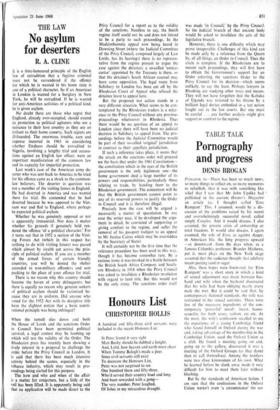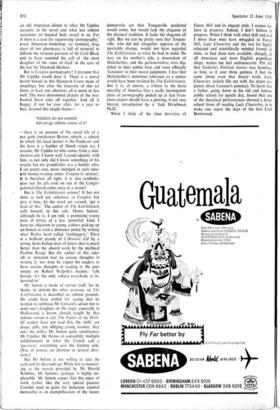Pornography and progress
TABLE TALK DENIS BROGAN
Princeton, NJ—There has been so much news, so many things to reflect on, so many memories to refurbish, that it was with something like relief that I saw that Mr John Updike had • published in the current Harper'.s. Magazine an article (as I thought) called 'Eros Rampant.' This, I assumed, would be a dis- cussion of the problems raised by his recent and overwhelmingly successful novel, called simply Couples. And it would discuss, I also assumed, the present crisis of censorship or total freedom. It would also discuss, I again assumed, the role of Eros, as against Agape, in American life, the long progress upward —or downward—from the days when, as a famous Columbia professor, Brander Mathews, put it, most plays on the New York stage assumed that the audience thought that adultery meant putting sand in sugar.
Alas, these hopes were frustrated, for 'Eros Rampant' was a short story in which a kind of sexual adjustment was made between hus- band and wife when the husband discovered that his wife had been obliging nearly every male she met. But it could be said that, by contemporary fictional standards, the wife was restrained in her sexual activities. There were few of the necessary ingredients of the con- temporary 'powerful' novel : incest, homo- sexuality for both sexes, sadism, etc etc. At the most, the wife's confession recalled to me the experience of a young Cambridge friend who found himself in Oxford during the war and, taking advantage of his membership in the Cambridge Union, used the Oxford Union as a club. He found a meeting going on and, going up to the gallery, discovered it was a meeting of the Oxford Groups (as they dared then to call themselves). Among the testifiers were two close kinswomen of his own. What he learned before he slunk away made it very difficult for him to meet them later without blushing.
But by the standards of American fiction, I am sure that the confessions in the Oxford Union weren't even 'a circumstance' (to use an old American idiom) to what Mr Updike recounts in his novel and what less solemn variations on musical beds reveal to us. For if there is a case for suppressing 'pornography,' every American bookshop, air terminal, drug store (if not pharmacy) is full of material to inflame the virtuous passions of Sir Cyril Black and to have sounded the call of 'the stern daughter of the voice of God' in the ears of the late Sir Theobald Mathew.
But is Couples pornography? I presume that Mr Updike would deny it. There is a moral lesson buried in this Hampton Court maze of couplings, but after the necessity of this art form, at least one abortion, all is more or less well. The most determined players of the two- backed beast take off together. And all is happy; if not for ever after, for a year or two. Around this simple theme—
'Adultery do not commit Advantage seldom comes of it'
—there is an account of the social life of a not quite top-drawer Boston suburb, a suburb in which the local dentist is the Pandarus and the hero is a builder of Dutch origin (as, I assume, Mr Updike is) who comes from a mid- western city I know well. I could identify with him, as not only did I know something of his origins but my grandfather was a builder who, I am pretty sure, never indulged in such time- and money-wasting antics. Couples is 'serious'; it is therefore all right; it is also symbolic; does not the gilt cock on top of the Congre- gational church come away in a storm?
But is The Exhibitionist serious? It has not done as well yet, saleswise, as Couples, but give it time, let the word get around, 'get a load of this.' The author of The Exhibitionist calls himself, in this role, 'Henry Sutton,' although he is, I am told, a promising young man of letters of a less 'powerful' kind. I have no objection to young authors picking up an honest or even a dishonest penny by writing what Walter Scott called 'skulduggery.' There is a brilliant parody of L'Histoire d'O by a young Scots-Italian man of letters that is much better than the absurd work by the mythical Pauline Map. But the author of this take- off or imitation had no serious thoughts in writing it, nor does he expect his readers to have serious thoughts in reading it. He goes simply on Robert Walpole's maxim: 'talk bawdy; it's the only subject everybody is in- terested in.'
Mr Sutton is made of sterner stuff, for he thinks to defend his other persona; so The Exhibitionist is described on solemn grounds. He could have settled for saying that he wanted to reinforce Mr Coward's advice not to send one's daughter on the stage, especially in Hollywood, a lesson already taught by that tedious roman d clef, The Valley of the Dolls. (If readers have not read this, the 'dolls' are drugs, pills, not obliging young women; they take the dolls.) Mr Sutton quite outdistances Mr Updike. He throws in coprophily, multiple exhibitionism in what the French call a `partottze,' everything and the kitchen sink. (Yes, of course, an abortion or several abor- tions.)
But Mr Sutton is not willing to take the cash and let the credit go. While not so nauseat- ing as the morals provided by Mr Harold Robbins, Mr Sutton's apologia is highly im- plausible. Mr Sutton argues that this piece of work (rather like the very special pictures Courbet used to paint for lecherous oriental monarchs) is an exemplification of the future
democratic art that Tocqueville predicted would come, but would lack the elegance of the classical tradition. It lacks the elegance all right. But we can be pretty sure that Tocqu- ville, who did not altogether approve of the inevitable change, would not have regarded The Exhibitionist as what he had in mind. He was, on his mother's side, a descendant of Malesherbes, and the parlementaires were dig- nified in their public lives and were officially 'Jansenist' in their moral judgments. I fear that Malesherbes's notorious tolerance as a censor would have been strained by The Exhibitionist. But it is, of course, a tribute to the basic morality of America that a really incompetent piece of pornography picked up at San Fran- cisco airport should have a glowing, if not very literate, introduction by a 'Jack Hirschman Ph.D.'
When I think of the clear narrative of
Fanny Hill and its elegant style, I cannot be- lieve in progress. Indeed, I don't believe in progress. When I think with what skill and zeal I more than once have smuggled in Fanny Hill, Lady Chatterley and the rest for highly educated and scientifically minded friends of mine, to find them now available, cheaply, in all American and most English paperback shops, makes me feel undemocratic. Pitt felt that Godwin's Political Justice was harmless, as long as it cost three guineas. I feel the same about even that dreary work, Lady Chatterley (which fills me with the dirpst sus- picion about Lorenzo's potency). To learn that a father, going down to his old and famous public school, for speech day, found that one of the theatrical performances showed a lower school form all reading Lady Chatterley, is to make one regret the days of the first Lord Brentwood.







































 Previous page
Previous page